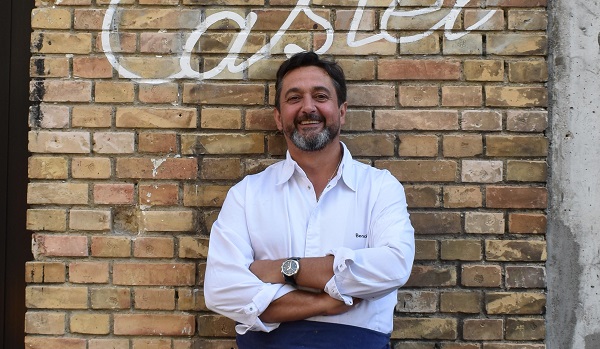
Brunch at Benoît Castel Ménilmontant, a pastry shop and bakery in the 20th arrondissement, is an ideal place to begin weekend wandering in the increasingly gentrified neighborhoods of eastern Paris. We came for the bread, we stayed for the brunch, and only later did we taste the heart of Benoît Castel’s trade, the pastries.
The Bread
While first and foremost a pastry chef, curiosity has led Benoît Castel to explore the pleasure and craft of making quality breads. One bread in particular caught my attention because it adds pinch of North America in Castel’s otherwise patently French pastry shops/bakeries in the 11th and 20th arrondissement.

“I have a supplier who goes around the world looking for interesting spices and then holds a tasting of them twice each year,” says Castel. “The scheduling of one tasting coincided with my reflections on creating a new bread for the shop. One of the products I tasted was alder wood smoked Salish salt from Washington State. As soon as I tasted it I said to myself, ‘I’ve got to use that,’ and I started to imagine a recipe around it. I liked the smoked woody taste that was both subtle and distinct enough that its flavor would come through while keeping the salt level down. And I decided to balance it out with the addition of the earthy-floral touch of honey.”
Save the salt allotment for the butter, that’s what I say.
Along with the honey and Salish salt bread he calls Pain du Coin, his daily bread line-up also includes a traditional baguette, a traditional rounded loaf, and a walnut, hazelnut and raisin bread called Le Granola. On weekends, two other hard-crust slow-fermented breads based on organic specialty flours join the shelves: Le Pain du Traquet Pâtre (flour from Morbihan, southern Brittany) and Le Pain des Deux Livres (flour from Lot-et-Garonne, between Bordeaux and Toulouse).
The hard-crust breads, some the size of couch cushions, nearly require a chain saw to be sliced. That’s a compliment—the play between the hard crust and the spongy heart is part of the pleasure of such breads.
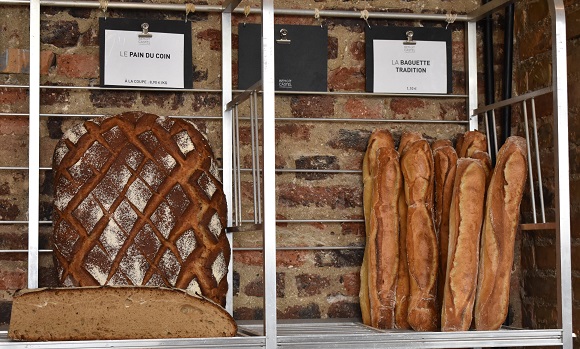
The Brunch
The typical traveler is unlikely to have a chain saw available to cut into a chunk of hard-crust bread during a Paris promenade. Not to worry, it’s already been sliced for those who come for brunch at Benoît Castel Ménilmontant, Castel’s pastry shop/bakery/breakfast/brunch shop-café in the 20th arrondissement.
The bread is only a small part of the pleasure of brunching here. Above all, this is a satisfying and friendly entry to a neighborhood that’s largely off-track for tourist. It’s an ideal place to begin weekend wandering in the increasingly gentrified neighborhoods of eastern Paris. From here you can explore the 20th and 11th arrondissements as you make your way back to center. (You needn’t actually wait for the weekend; Benoît Castel Ménilmontant is also open for breakfast, as wells for a light lunch Wednesday through Friday.)
The semi-industrial décor, the old bread oven in the back, the canteen-style plates, the mismatched tables and chairs, and the haphazard décor are as much a reflection of Castel’s enjoyment of sourcing furnishings from flea market and second-hand shops as it is a sign that the space is fully at home in entrepreneurial (some would say Brooklynesque) eastern Paris.
There’s an open pastry kitchen, where you might see Castel putting the finishing touches on a pie.
That, too, is a sign of the times. In an open kitchen there are no secrets and no pretentions other than to keep it fresh, keep it simple, keep it good. (The bread is made in the basement.)
During brunch, Castel works non-stop while always available for frequent interruptions from clients.

At 29€, Benoît Castel Ménilmontant’s brunch is on the upper end of brunch prices in eastern Paris. But it’s all-you-can-eat, linger-‘til-you’ve-had-your-fill, there’s-something-to-please-everyone, and compares favorably with typical 22€ single-plate offering.
Generally speaking, brunch is not a working class outing in Paris, so a 29€ brunch in an area that was, until a decade ago, largely considered a neighborhood of working class and immigration, is a sign of how much eastern Paris has changed and is changing. It remains a melting pot, though the new arrivals represent less diversity and more financial comfort than earlier arrivals.
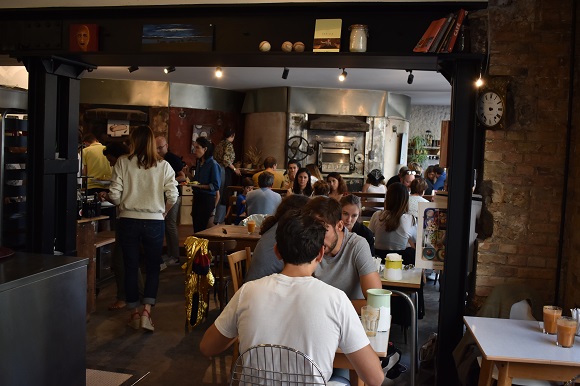
It’s a self-serve brunch, other than the glass of fresh squeezed juices (choice of orange, apple and carrot during our brunch) that will be brought to the table.
Castel says that it’s not unusual for brunchers to stay for two hours. We did. We took a seat at 11:30AM, tried all of the breads, croissants, homemade jams and butter for breakfast, sat for a few minutes with coffee, then eased into lunch. Whether because we take our job as travel journalists seriously or because we were feeling particularly voracious, we tasted everything: the egg dish, the hams, and the salads, then the ribs, the chicken and the other salads, all country-style and freshly prepared. There’s something for everyone. We picked from each other’s plates the ones we cared for that the other didn’t.
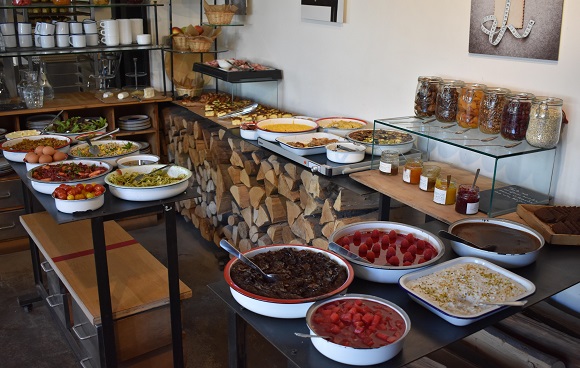
Brunch doesn’t include the single-serving tarts and dinner-party-size pies available in the pastry shop. Yet the family-style desserts at brunch—French toast pie, panna cotta, chocolate mousse, and watermelon with a strawberry coulis—are evidence already of Castel’s easy-going sense of the sweet life.
We lingered, and only the promise of a sunny afternoon stroll pulled us from our seats.
The Pastries
Pastries are the heart of Benoît Castel’s craft and trade. It’s a craft he began training in as a teen in Brittany and has pursued in Paris since the age of 17.
Individual pastries can be purchased as an add-on to brunch, but you’re unlikely to find room in your appetite. Better to return another time. Or zig-zag slowly through eastern Paris as you make your way downhill toward Castel’s small shop on rue Jean-Pierre Timbaud. By the time you arrive you be ready for a tart of one kind or another.
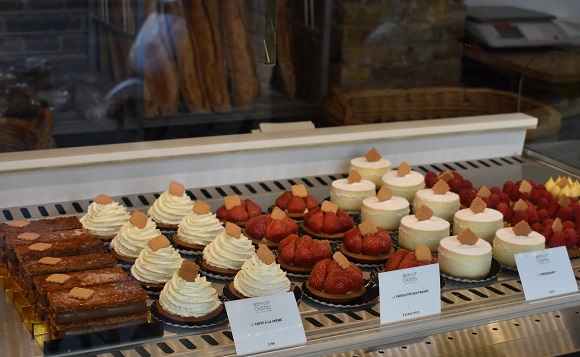
Fans of glossy pastry pics for their Instagram feed may be a bit disappointed to find that Castel’s creations aren’t covered in cute and cheery. He eschews efforts to raise the profile of his pastries through purely decorative means or coloring. His palette is pastel rather than acrylic. Quality classics reign, such as the simple and simply delicious tarte à la crème, along with the tartelette aux fraises, the tartelette aux framboise, the tarte citron, the millefeuille (napoleon) and the moelleux chocolat. The display counter may also include the occasional foreign (but increasingly common) intruder such as a light round of cheesecake.
Castel’s pastry signature is a tiny tart-topping square of shortbread (sablé), placed on top like a cocked cap, inviting us to enjoy, to share, and not take any of this too seriously.

Several crumbs of baking history
The Ménilmontant shop bears some Paris bread-baking history. It was here that, in 1960, Bernard Ganachaud, a son of bakers, opened his first Paris shop, Boulangerie Ganachaud. In 1968 Ganachaud turned to baking his bread in a wood-burning oven, the old-fashion way. The old oven is still visible here.

In 1981, Ganachaud created the recipe for flûte Gana, a traditional poolish pre-fermented stick of bread with a crackly crust and a tender airy crumb. The Gana is a fairly well-known branded bread in Paris, though its fame pales in comparison with that of Poilâne bread, a country-style sourdough bread baked in a wood-burning oven, whose international reputation developed under Lionel Poilâne. Nevertheless, more than 200 bakeries are licensed to produce the flûte Gana in France. The Ganachaud family sold the shop now owned by Benoît Castel long ago as they expanded their little empire in other quarters. Those on the bread tour of eastern Paris might stop at the Ganachaud boutique at 226 Rue des Pyrénées (20th arr.), a 7-minute walk from here.
Benoît Castel Ménilmontant
150 rue de Ménilmontant
75020 Paris
01 46 36 13 82
Open Wed.-Fri., 7:30AM-8PM. Breakfast and light lunch served those days. Open Sat. 8AM-8PM and Sun. 8AM-6PM. Brunch is served Saturdays and Sunday 10:30AM to 3:00PM. The space seats 50. Reservations are not taken, so arrive for brunch by 11:30AM or after 1:30PM to avoid a line. By the time the day’s crumbs have been cleared, 100 to 120 people have brunched here.
Benoît Castel Jean-Pierre Timbaud
72 rue Jean-Pierre Timbaud
75011 Paris
01 48 06 70 59
Open Mon.-Sat. 8AM-8:30PM, Sun. 8AM-6PM.
Castel also operates the joyfully named Josephine Bakery at 42 rue Jacob in the 6th arrondissement. The little shop isn’t big on bread but is well situated for tourists looking for a snack in the area. Open Mon.-Fri. 7:30AM-7:30PM.
Map showing the location of the Ménilmontant and Jean-Pierre Timbaud shops.
If visiting the neigbhorhoods in eastern Paris, you might find yourself on rue Jean-Pierre Timbaud, as an American couple who brunched at Benoît Castel Ménilmontant did in Paris Street Talk: Chadors, Cannibals, Communists and the Wall of 3 Crowns.
© 2018, Gary Lee Kraut

